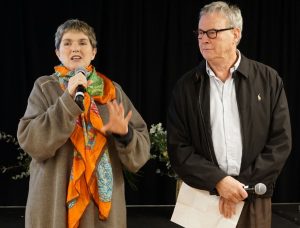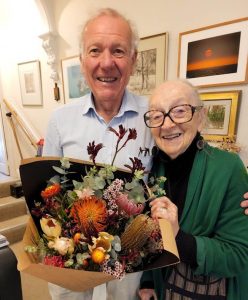Ian Stephenson, Bulletin 9/2022, November 2022

After ten years as editor of the Bulletin Virginia Simpson-Young is standing down. Virginia has done a great job, always going above and beyond the call of duty. Having worked with many editors in my career I can honestly say Virginia is one of the best. She respects her contributors’ copy while at the same time being firm about improving it. She works brilliantly under pressure and always delivered great Bulletins on-time. This is the complex tightrope an editor must walk. Ten years, that’s one hundred Bulletins and a lot of walking the high wire, it’s an amazing achievement and it has been informed by her deep love of and rich knowledge of Glebe. From all the members I would like to convey my heartfelt thanks. Well done, Virginia, I induct you into the Glebe Society Hall of Fame.
Allan Hogan, Convenor of the Communications Committee as well as a former President of the Society, has generously donned Virginia’s mantle as acting Editor while we search for her successor. Allan cut his teeth on the UNSW student newspaper and had a distinguished career as an investigative journalist including with ABC Radio’s AM, and as a reporter and producer on programs such as This Day Tonight and Four Corners. He reported on the Vietnam War at the front line and was the only Australian journalist to interview Idi Amin. Later he worked as a producer with the 9 Network and SBS. Thank you, Allan, for stepping into the breach.
Speaking of talent, I am pleased to announce we have three new convenors – Louis Taborda, Community, Tamira Stevenson, Environment and Duncan Leys, Transport. The next Bulletin will feature background stories about them. Welcome to the management committee Louis, Tamira and Duncan.
I have just returned from a week in Geraldton and its hinterland looking at the work of the relatively unknown architect John Hawes (relatively unknown in the East that is). He designed two cathedrals, over 40 churches, convents and a homestead in Western Australia as well as working in England and the Bahamas. His buildings are idiosyncratic, beautifully detailed and range from Spanish Mission to Gothic revival to modernist. If you want to read more about his unusual life enter John Cyril Hawes in the Australian Dictionary of Biography online. The work of the Monsignor Hawes Heritage Centre to conserve and celebrate his work, much of which is in very small remote towns, is inspiring. Led by Robert Cross and relying mainly on volunteers they are a ‘can do’ organisation.
I returned in time to visit another inspiring person, Norma Hawkins, and present her with bouquet of flowers from the Society to celebrate her 100th birthday.

Norma has had a rich and interesting life. It has included a long involvement with the New Theatre, producing films for the Waterside Workers Federation in the 1950s and, in more recent times working with the Blue Wrens, our ecology arm.
As well as having a great love of music, Shubert’s string quintet is one of her favourite pieces, she has facilitated new music by commissioning Ian Munro to write Three Birds a song cycle for soprano Sara Macliver and the Australia ensemble. The work brings together poetry from three eras, three places and by three very different poets — Judith Wright, Emily Dickinson and Matsuo Basho — the theme of birds, or man’s (and woman’s) relationship and fascination with birds, is explored across the centuries and continents.
Norma has a generous heart, a lively mind and is a great conversationalist. She has the knack of taking the exchange into interesting places and it is always a dialogue. On my recent visit we talked about theatre, ballet, poetry and our interactions with birds. We finished by reading aloud Judith Wright’s poem Magpies.
Norma, talking with you brings to mind the title of one of Barry Humphries autobiographies – More Please.
Congratulations from the Society on your 100th birthday – more please.








There are no comments yet. Please leave yours.